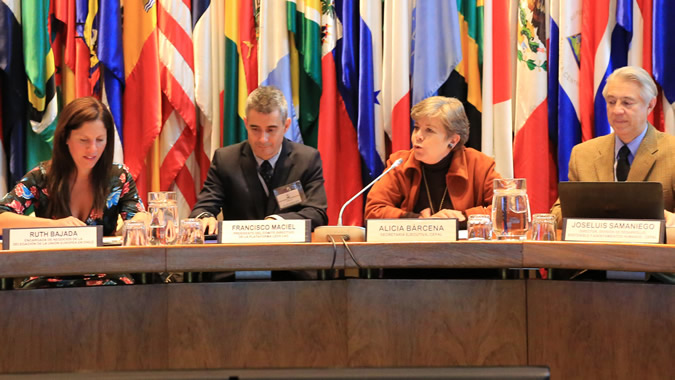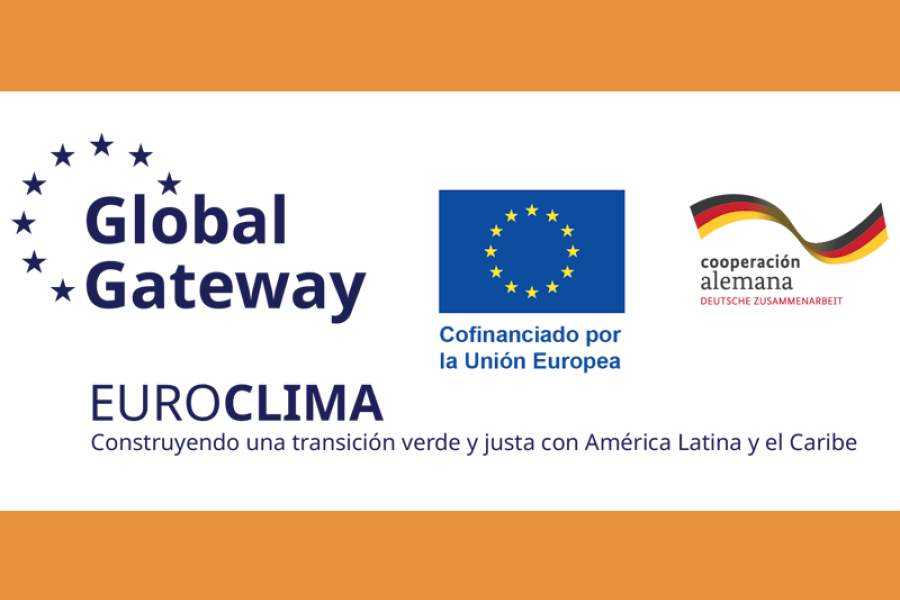Experts Stress the Urgency of Decarbonizing Economies to Stem the Ecological Debt and Concretize the Environmental Big Push
Work area(s)
ECLAC’s Executive Secretary, Alicia Bárcena, inaugurated the First Peer-to-Peer Dialogue of Euroclima+ Countries.

Decarbonizing economies is essential for stemming the ecological debt and concretizing the environmental big push, according to experts gathered at the First Peer-to-Peer Dialogue of Euroclima+ Countries, which began yesterday at the central headquarters of the Economic Commission for Latin America and the Caribbean (ECLAC) in Santiago, Chile.
The workshop on “Sectoral and multi-level articulation to strengthen the implementation of Nationally Determined Contributions (NDCs) in Latin America” was inaugurated by Alicia Bárcena, ECLAC’s Executive Secretary; Francisco Maciel, Chair of the Steering Committee of the LEDS LAC platform; and Ruth Bajada, Chargé d'affaires of the European Union’s Delegation in Chile.
Other participants included Ligia Castro, the Director of Sustainability, Inclusion and Climate Change at the CAF-Development Bank of Latin America, and Fernando Montenegro, the Chief of Operations at the Inter-American Development Bank (IDB) in Chile.
During her remarks, Alicia Bárcena emphasized that the global economy’s current conditions are reflected in growing inequality and a development model that is still based on the indiscriminate use of fossil fuels, which endangers global public goods such as the climate, public health, oceans and biodiversity.
She added that the United Nations and ECLAC have posed the importance and urgency of moving toward a sustainable global development that allows for preserving our economic, social and environmental heritage for future generations as the only solution for confronting these global challenges. This vision is reflected, for example, in the approval in 2015 of the 2030 Agenda for Sustainable Development and the Paris Agreement on climate change.
“While in economics not adapting to fiscal space implies indebtedness and in some cases the creation of global debt, with the environment it is a zero-sum game,” ECLAC’s Executive Secretary warned.
She added that, if countries effectively embrace the effects of the Nationally Determined Contributions and of the 2030 Agenda, “there will be paths to development and investments that will no longer be viable and they will have to be replaced by others that offer better results so that, while ensuring that no one is left behind and while generating the necessary decent work with the elimination of poverty, and while also achieving cities with quality of life and fulfilling the various dimensions of the agenda, we can stay within a certain environmental space.”
“This necessitates other public policies and other investments to achieve low-carbon development. It requires an environmental big push,” she affirmed.
Alicia Bárcena highlighted that Latin America and the Caribbean “is not the region that will be able to impose conditions on others to limit their development, nor will it be able to avoid suffering the damage of global warming today or in the future. What we can do is keep these costs from being paralyzing and ensure that the space for development be of the best quality for our countries, and not just for short-term interests and minority groups,” she added.
In his remarks, Francisco Maciel called for strengthening cooperation to confront climate change and humanity’s problems.
Ruth Bajada, meanwhile, noted that Latin America and the Caribbean faces significant risks on environmental matters and said that Euroclima+ is the European Union’s contribution to mitigating those effects. She added that, in the current scenario, the full and effective implementation of the Paris Agreement on climate change is urgent.
Ligia Castro called for contributing to stronger partnerships between the private sector, the public sector, civil society and academia, and she stressed the importance of transforming banking into a green industry.
Finally, Fernando Montenegro warned that the impacts of climate change threaten the achievements made in terms of poverty and food security, among others, which means that the goals of the Paris Agreement must be urgently met.
This regional dialogue, which concludes on Friday, August 3, seeks to identify the needs and opportunities of the region’s countries to enhance and strengthen implementation of the Nationally Determined Contributions, which represent the commitments made by countries to comply with the Paris Agreement and to confront climate change.
Related content
Reunión Articulación sectorial y multinivel para fortalecer la implementación de NDCs en América Latina
Reunión en CEPAL sólo el día miércoles 1 de agosto y en el Centro de Convenciones del Hotel Galerías los días 2 y 3 de agosto
